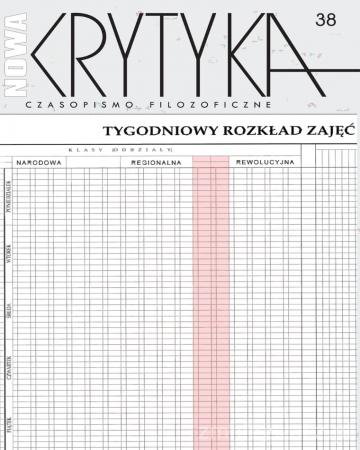




| Authors: |
Jacek
Tittenbrun
Uniwersytet im. Adama Mickiewicza w Poznaniu |
| Keywords: | Marx Simmel organ donation surrogacy sex industry prostitution reproductive medicine |
| Data publikacji całości: | 2016 |
| Page range: | 22 (7-28) |
| 1. | Barry B. 1990. Political Argument, London: Routledge, |
| 2. | Bignell J. 2008. An Introduction to Television Studies, London–New York: Routledge, |
| 3. | Bordo S. 1999. The Male Body: A New Look at Men in Public and in Private, New York: Farrar, Straus and Giroux, |
| 4. | Clay F. 2012. What is a Good Hospital?, “The Guardian” z 27 maja 2012 roku |
| 5. | Cohen C.B. 1999. Selling Bits and Pieces of Humans to Make More of Them: The Gift of the Magi Revisited, “The Journal of Medicine and Philosophy”, 24(3):288-306, |
| 6. | Coser L. 1977. A Note on the ‘Philosophy of Money’, w: Masters of Sociological Thought: Ideas in Historical and Social Context, New York: Harcourt Brace Jovanovich, Incorporated, |
| 7. | Daniels C.R. 2008. Exposing Men: The Science and Politics of Male Reproduction, New York: Oxford University Press, |
| 8. | Davey H. 2010. Faking Positive Emotions for Our Jobs: At What Cost?, Huffington Post, www.humngtonpost.com/helen-davey/positive-emotions-commoditization_b_773103.htmlC. |
| 9. | Davis F.D. 2013. Organ Markets and the Ends of Medicine, “Journal of Medicine and Philosophy”, vol. 34, issue 6M: 586-605, |
| 10. | Deflen M. 2003. The Sociology of the Sociology of Money: Simmel and the Contemporary Battle of the Classics, “Journal of Classical Sociology”, 3(1):67-96 |
| 11. | Dotson E. 1999. Behold the Man the Hype and Selling of Male Beauty in Media and Culture, Binghamton, NY: Haworth Press |
| 12. | Fabre C. 2006. Whose Body is it Anyway?: Justice and the Integrity of the Person, Oxford: Oxford University Press |
| 13. | Fitzgerald J. 1998. Genericizing Disability: The Human Genome Project and the Commodification of Self, “Issues in Law & Medicine”, fall, vol. 14, issue 2, |
| 14. | Fox R., Swazey J. 1992. Spare Parts, New York: Oxford University Press |
| 15. | Fromm E. 1955. The Sane Society, New York : Rinehart |
| 16. | Hakim C. 2010. Erotic Capital. The Power of Attraction in the Boardroom and the Bedroom, New York: Basic Books, |
| 17. | Holligan A. 2011. Amsterdam’s Prostitutes Targeted by Dutch Tax Officials, BBC News, 21 marca 2011 roku |
| 18. | Kalindi J. V. 2009. Indian Transnational Surrogacy and the Commodification of Vital Energy, “Subjectivity”, no. 28(1): 266–278 |
| 19. | Kaveny C. 1999. Commodifying the Polyvalent Good of Health Care, “Journal of Medicine and Philosophy”, Jun;24(3):207-223, |
| 20. | Leddick D., Sanchez H. 2011. Escorts: 40 Profiles with Photographs of Men Who Sell Sex, Miami Beach: White Lake Press |
| 21. | Marx K. 1988. Economic and Philosophic Manuscripts of 1844, Buffalo, NY: Prometheus Books, |
| 22. | Murray T. 1996. New Reproductive Technologies and the Family, w: C. Cohen (red.), New Ways of Making Babies: The Case of Egg Donation, Bloomington: 51–69 |
| 23. | Pateman C. 1988. The Sexual Contract, Stanford, Stanford University Press, |
| 24. | Posner R. 1992. Sex and Reason, Cambridge: Harvard University Press, |
| 25. | Radin M. 1996. Contested Commodities, Cambridge: Harvard University Press, |
| 26. | Reynolds H. 1986. The Economics of Prostitution, Springfield: C.C. Thomas, |
| 27. | Sandel J. 1998. What Money Can’t Buy: The Moral Limits of Markets, Oxford: Oxford University Press, |
| 28. | Simmel G. 1964. The Sociology of Georg Simmel, New York: Collier-Macmillan |
| 29. | Steinbock B. 2011. Life before Birth: The Moral and Legal Status of Embryos and Fetuses, Oxford: Oxford University Press, |
| 30. | Sterling T. 2011. Dutch Prostitutes Sought By Taxman, http://www.huffingtonpost.com/2011/01/12/dutch-prostitutes-taxes_n_807843.html |
| 31. | Tierney D. 2012. What Isn’t for Sale, “The Atlantic”, https://www.theatlantic.com/magazine/archive/2012/04/what-isnt-for-sale/308902/ |
| 32. | Veen M. van der, 2000. Beyond Slavery and Capitalism: Producing Class Difference in Sex Industry, w: Class and Its Others, red. J.K. Gibson-Graham, Minneapolis: University of Minnesota Press, |
| 33. | Wilkinson S. 2003. Bodies for Sale, London: Routledge. |